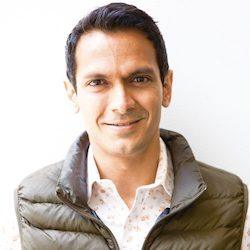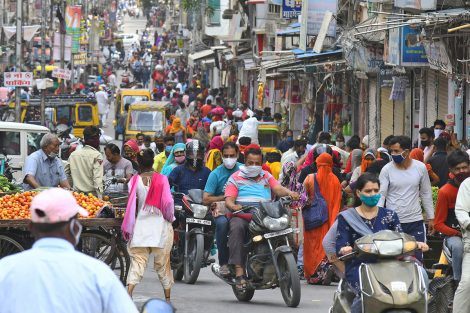July 7, 2021 – The deadly COVID-19 surge in India and South Asian countries over the past few months has led to overwhelmed hospitals, questionable treatments for patients, and rampant misinformation. In addition, countries have struggled to ensure consistent mask-wearing while waiting for larger percentages of their populations to be vaccinated.
Alarmed by the crisis, Harvard T.H. Chan School of Public Health’s Satchit Balsari helped create a consortium called the Swasth Community Science Alliance (CSA), aimed at providing simple and practical guidelines on how to manage COVID-19 in rural or resource-poor areas in India. CSA has also been collaborating with another group of experts, led by researchers from Yale University, that recently launched a campaign aimed at normalizing mask-wearing throughout South Asia, called NORM. Those involved in these combined efforts include scientists, physicians, and public health practitioners from Bangladesh, Pakistan, India, Nepal, and the South Asian diaspora.

“We believe that addressing COVID-19 in South Asia has to be a multi-pronged approach—masking, treatment, and vaccine preparedness,” said Balsari, who is an assistant professor in Harvard Chan School’s Department of Global Health and Population, a fellow at the Harvard FXB Center for Health and Human Rights, and a member of CSA’s scientific advisory board. “We also think it’s important that scientists from across South Asia work together to identify shared solutions.”
The work of CSA and NORM in South Asia was the focus of a recent op-ed that appeared simultaneously in major publications in India, Pakistan, Nepal, and Bangladesh on June 17, 2021. Balsari co-authored the piece with colleagues from Yale and Lahore University of Management Sciences. Balsari also co-authored a June 6, 2021, Lancet article that emphasized the importance of evidence-based COVID-19 interventions in India.
Sharing proven protocols
CSA was formed in late April by Balsari; several Harvard Chan School graduates including Ajay Nair, MPH ’07, CEO of Swasth, a nonprofit focused on telemedicine in India, and health economist Manoj Mohanan, MPH ’00, SM ’04, PhD ’09, an associate professor at Duke University; researchers from other academic institutions; and a group of nonprofits in India. They began their efforts because they were troubled by the widespread use in India of ineffective interventions, often promoted by state agencies. In hospitals, COVID-19 patients were receiving unnecessary diagnostics such as CT scans and batteries of lab tests, and were being prescribed medications that have not been shown to be effective COVID-19 treatments, such as hydroxychloroquine and ivermectin. Desperate families were sometimes depleting their savings to procure these and other unproven drugs on the black market. Hospitals were crowded with patients who could have been cared for at home, while some who were extremely sick were turned away.
“Science has shown that most people need very little for COVID treatment,” said Balsari. “We need to keep them at home, monitor their oxygen saturation, and give them oxygen if needed.”
The CSA team has focused on laying out clear, evidence-based protocols for diagnosing and treating COVID-19. Their website includes information kits for both health workers and families on how to provide COVID-19 support outside of hospitals when possible, and how to recognize when hospitalization is necessary. For instance, the kits provide checklists for community health workers monitoring patients at home, detailed instructions for providing oxygen and proning patients who are cared for in health care facilities, clear warnings about what drugs not to use, and steps to prevent mucormyscosis, a serious fungal infection that has plagued COVID-19 patients in India.
“We wanted to work with community-based organizations to help them directly benefit from the latest cutting-edge science,” Balsari explained. “There’s been a growing body of literature about COVID-19 over the past year, and we wanted to take what we were learning—which were very simple things about COVID-19 management—and putting this information into short videos or training modules that can be used by community health workers.”
He added, “Getting the guidelines ready is just the first step. The CSA is working with grassroots organizations across South Asia to help them adopt the developed guidelines, cross-pollinate ideas across political borders, and use science as a common language. We’re recognizing that there’s a lot more work to be done—that the onus is on scientists to take the knowledge from the bench to the bedside.”
photo: iStock
